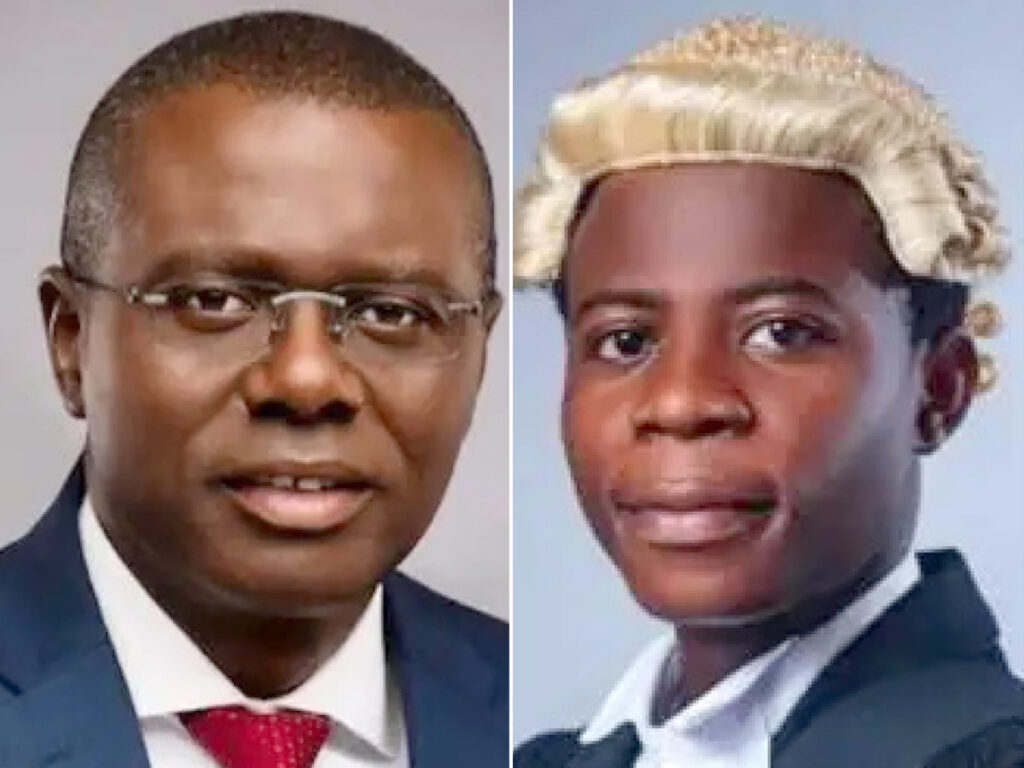A Lagos-based human rights lawyer, Festus Ogun, has filed a lawsuit against Lagos State Governor Babajide Sanwo-Olu at the Federal High Court in Lagos, accusing him of violating his constitutional rights by blocking him on his verified X (formerly Twitter) account.
Recall that Festus Ogun, founder of FOLEGAL, in November 2021, sued Ogun State Governor Dapo Abiodun for failing to disclose the findings of the EndSARS panel in the state.
In his current suit against the Lagos State governor, marked FHC/L/CS/1739/25, Ogun argued that the governor’s decision was “wrongful, unconstitutional, arbitrary, and discriminatory” because it was linked to his criticisms of government policies and his demands for accountability regarding the October 2020 #EndSARS killings at the Lekki Tollgate.
Ogun explained that in 2021, he discovered that Sanwo-Olu had blocked him following a series of “constructive criticisms” directed at the governor. According to him, the move has since prevented him from accessing crucial governance-related updates and public communications from the governor’s office.
“Blocking me on X has prevented me from accessing public updates and receiving information about policies and governance in Lagos, which constitutes a violation of my right to receive information without interference,” Ogun stated.
The human rights lawyer is seeking multiple reliefs from the court, including a declaration that the blocking infringes on his rights to freedom of expression and access to information, an order compelling Sanwo-Olu to unblock him, and a perpetual injunction preventing the governor or his agents from blocking him or other citizens on social media.
He is also demanding a public apology from the governor, to be published on his verified X handle, for what he described as the “emotional trauma and mental distress” the action caused.
Unlike other rights cases where plaintiffs seek damages, Ogun has clarified that he is not asking for financial compensation. “I will not ask for damages, so I won’t be seen as a gold-digger. Just unblock me,” he wrote on X.
Ogun argued that the matter goes beyond his personal grievance, stressing that intolerance to criticism by elected officials undermines democracy.
“This suit is not just about me. I filed it in furtherance of public interest, hoping it will set a precedent in our digital rights jurisprudence,” he said.
In support of his case, the lawyer cited the 2019 ruling in the United States case of Knight First Amendment Institute v Trump, where the then-President Donald Trump was found to have violated citizens’ free speech rights by blocking them on Twitter.
He urged the Nigerian court to be persuaded by that precedent.
The case has attracted attention because it touches on Nigeria’s evolving digital rights landscape.
This is not the first time Ogun has challenged the government over civil liberties. A long-time critic of the Lagos State administration, he has previously condemned the handling of the #EndSARS protests and warned about growing efforts to silence critics online through arrests, surveillance, and digital restrictions.
Legal analysts note that while suing over a social media block is rare in Nigeria, the case may carry significant implications since it involves a democratically elected governor using an official platform. Constitutional lawyers argue that public officials have an obligation to maintain open channels of communication with citizens and that blocking critics could be interpreted as censorship.
The Federal High Court is yet to fix a hearing date for the suit, but activists and digital rights groups are already monitoring the proceedings, viewing it as a potential landmark in the protection of free speech in Nigeria’s online space.




